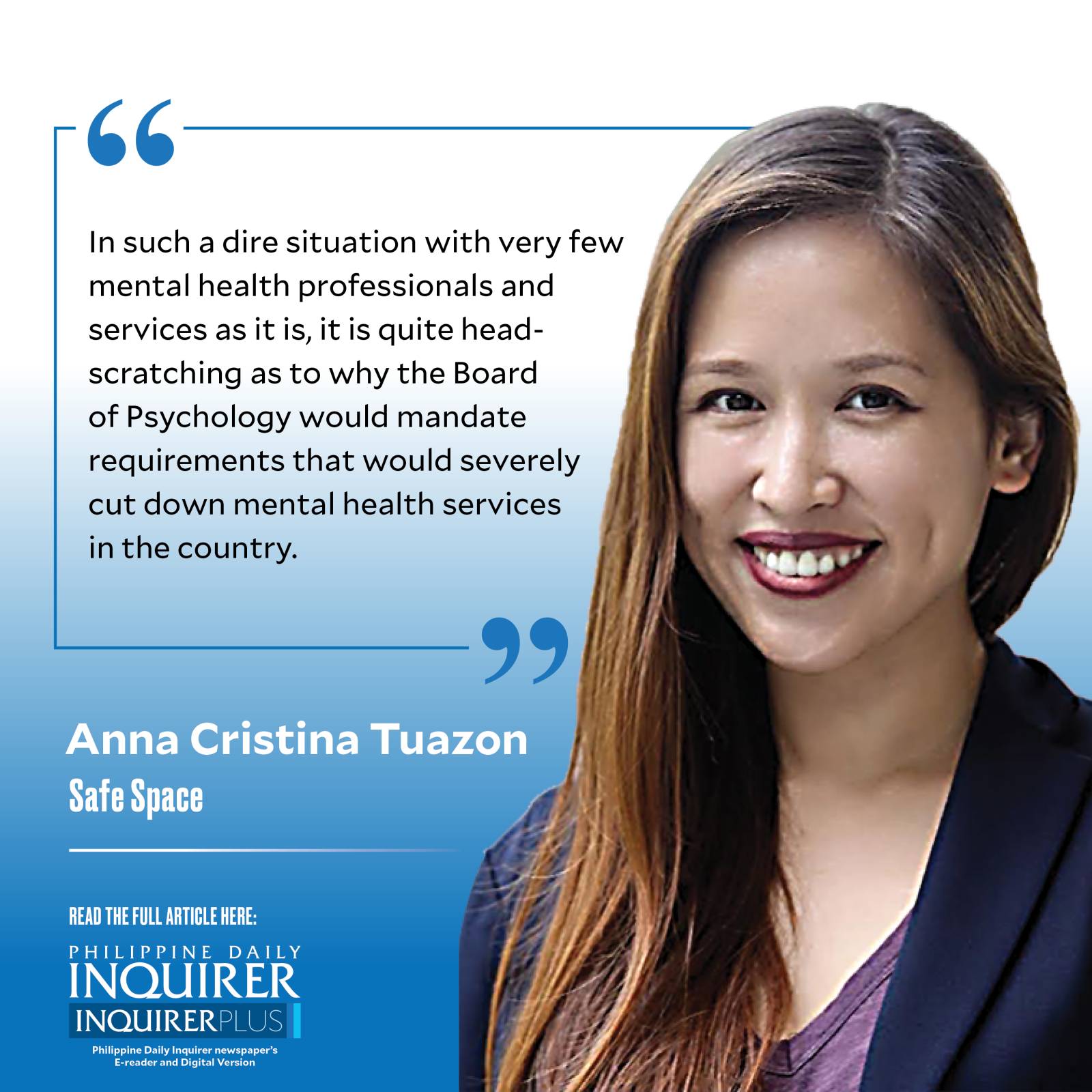Board of Psychology goes overboard

Philippine professional psychology is in a state of upheaval. Last June 30, the Professional Regulatory Board of Psychology published their Resolution No. 4 on rules and regulations to implement Section 33(B) of Republic Act No. 10029, entitled Philippine Psychology Act of 2009 on the issuance of permit to operate a psychology or psychometrics office, center, clinic, or facility. While the law entitles them to issue permits to corporations, partnerships, associations, or other similar entities provided that they are “competently staffed with a psychologist and equipped with sufficient and adequate psychology-related instruments and facilities,” it seems that the board was a bit too eager and created overreaching requirements that, if implemented on the effectivity date of July 16, would shut down multiple mental health services across the country. Whole provinces would be bereft of qualified psychology clinics, thus turning them into mental health deserts.
Let us first understand the state of psychology practice in the Philippines. To be a psychologist in the Philippines requires a master’s degree. To competently and ethically hold a clinical practice, one must train in a graduate level clinical or counseling psychology program. Not all psychologists are therefore trained to treat patients. However, our current psychology law does not distinguish between clinical and nonclinical psychologists, thereby psychologists of various specializations can still obtain a license. The first Philippine psychology board exam only started in 2014, licensing 35 out of 53 applicants. During the last board exam held in 2022, the number of passers were 226. Out of roughly 1,700 licensed psychologists, only about 800 are engaged in clinical practice. That gives us a ratio of one licensed practicing psychologist for every 125,000 Filipinos. It shouldn’t be a wonder then that waitlists in psychology clinics tend to stretch to months—and this is only in private practice! In government or public practice, very few plantillas or job items are available for psychologists. The salary grade (SG) of a psychologist in government, for a profession that requires a master’s degree, starts at SG 11 which gives them only P25,000 a month. Creating new plantillas is an almost impossible task and so personnel complement is unlikely to be augmented. The few psychologist positions in government also tend to be reserved for administration, research, or to provide service only in inpatient facilities, with very little offering of outpatient or community mental health services.
In such a dire situation with very few mental health professionals and services as it is, it is quite head-scratching as to why the Board of Psychology would mandate requirements that would severely cut down mental health services in the country. Despite having only six years’ worth of board exams, the board has required that each clinic or center be headed by a psychologist with seven years of experience, including three years of supervisory experience. It is projected that roughly only 100 psychologists in the country will fit this criterion. With the Mental Health Act requiring offices, schools, and hospitals to offer mental health services, 100 psychologists are nowhere adequate enough to head the tens of thousands of mental health units in organizations.
We also have cases where only one or two psychologists practice in a province and if this resolution will be implemented, it will prevent them from opening and maintaining a clinic. If so, that province will have no psychology clinic to go to and will have to travel to other provinces to do so. This creates a significant barrier to mental health, not to mention discriminates against Filipinos who are not in Metro Manila and those who cannot afford to travel just to access health care.
The resolution also requires that the head of the psychological services unit be employed full-time. This decimates most nonprofit and community services which do not have resources to pay for a full-time position. In current practice, most psychologists heading such outfits do so either on a voluntary or consultant basis to align with the organization’s meager budget while allowing them to work in multiple settings. If forced to go full-time at a job that does not pay, what do you think will happen? The employment requirement also does not take into context that most clinics are, in essence, group or cooperative practices. These are psychologists who share operational expenses such as rent and administrative personnel but practice autonomously. Forcing a hierarchical structure such as a head of unit will render group practices extinct. If they will attempt to comply with the resolution, it will greatly increase their costs and, in turn, raise therapy prices even higher.
With the effective date looming in a few days, I hope that the Board of Psychology takes heed of the professions’ concerns and places a moratorium on their resolution until it can craft policies that promote the quality of mental health service without destroying it altogether.
—————-
aatuazon@up.edu.ph




















